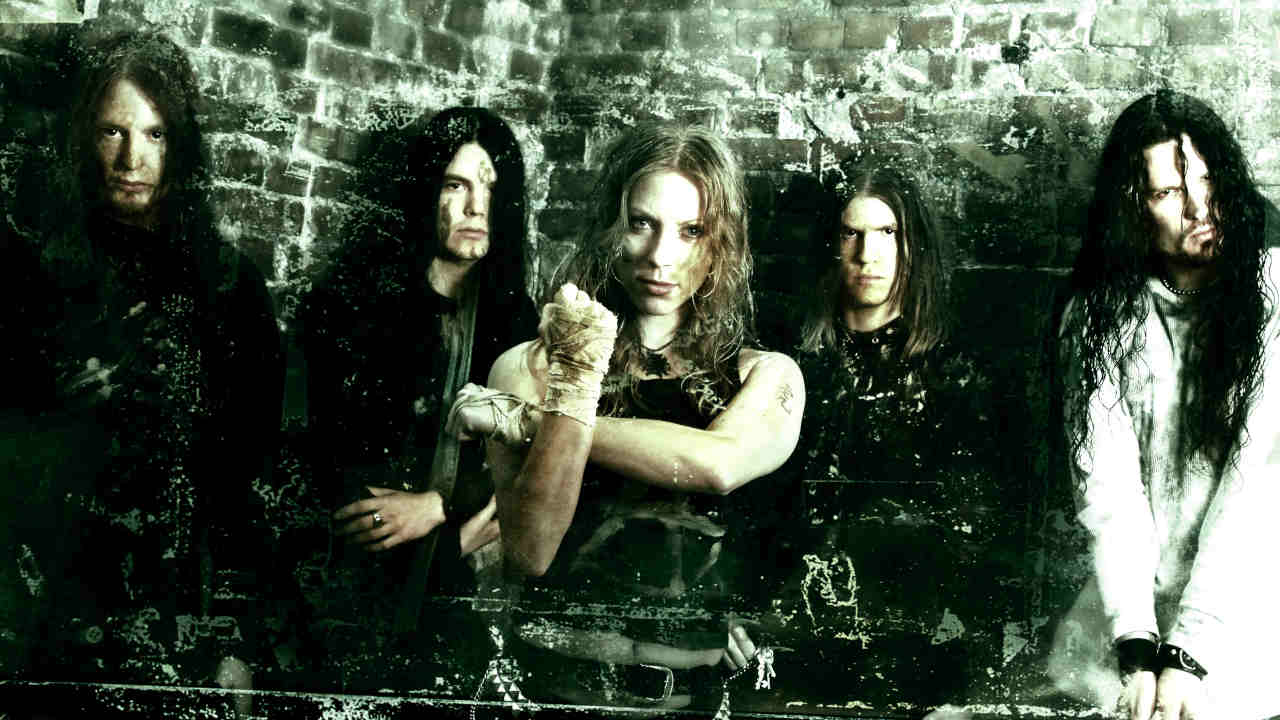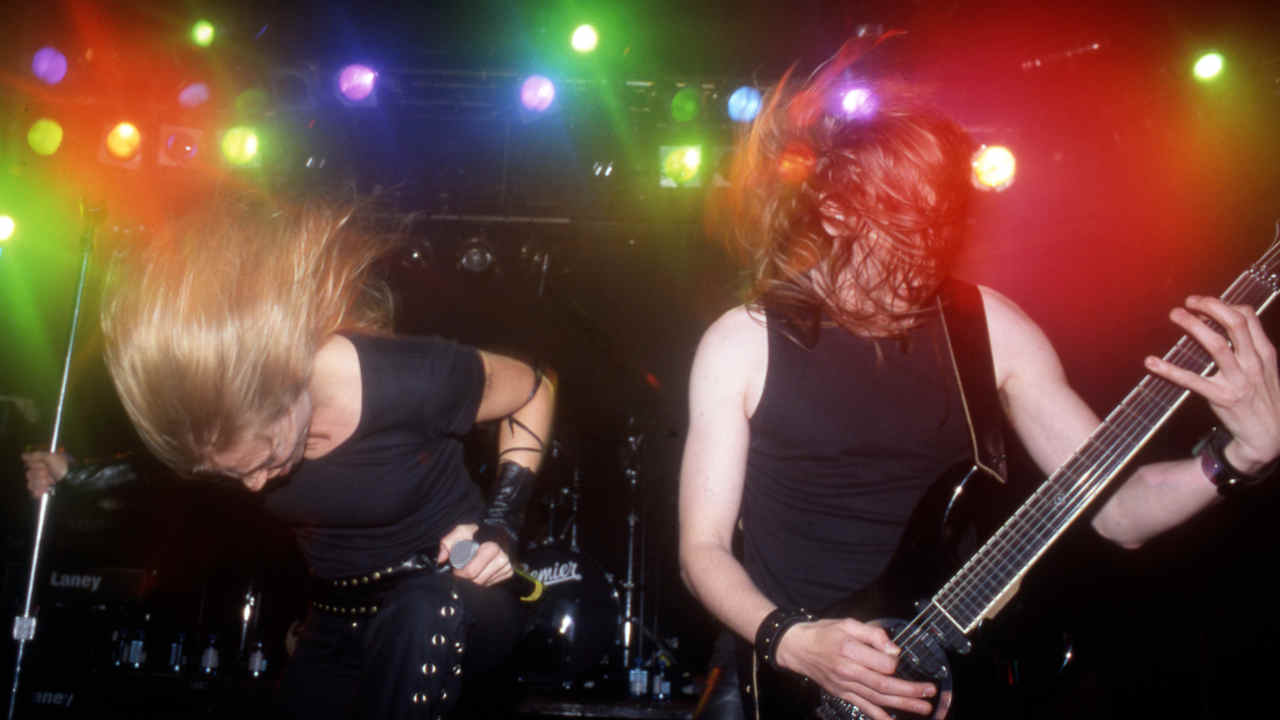“Getting in Angela Gossow was like throwing out your pet rabbit and getting a Rottweiler. It was a lot more brutal”: how Arch Enemy’s Wages Of Sin reinvented extreme metal for the 21st century
Arch Enemy’s Wages Of Sin marked the debut of singer Angela Gossow – and put them on the melodic death metal map

Arch Enemy emerged from the Swedish death metal scene in the mid-1990s, but it was 2001’s Wages Of Sin album that truly put them on the map thanks in a large part to new vocalist and not-so-secret weapon Angela Gossow. In 2007, Arch Enemy guitarist Michael Amott looked back on the album that changed the course of extreme metal.
Arch Enemy had begun rather modestly in 1995, put together by guitarist Michael Amott after leaving previous band, the indomitable Carcass just after their Heartwork album. The Swede already had the more stoner-oriented Spiritual Beggars on the boil, but wanted a more deathly style band as well.
With their ranks bolstered by Amott’s younger brother Christopher on guitar, ex-Carnage vocalist Johan Liiva and former Eucharist drummer Daniel Erlandsson, Arch Enemy released their debut album, Black Earth, in 1996 on the Wrong Again label. At this point, the band were very much the guitarist’s solo vision – he wrote all the songs and even played bass on that record.
Two years later, with bassist Martin Bengtsson in place and drummer Peter Wildoer replacing Erlandsson, they signed to Century Media, and put out the Stigmata album. By 1999, former Mercyful Fate bassist Sharlee D’Angelo had come in, with Erlandsson returning behind the kit, for the acclaimed Burning Bridges album. However, Amott was far from convinced that he had the ultimate Arch Enemy line-up in place.
Intent on achieving a more balanced amalgam of death metal fire and melodic creativity, Liiva was seen as the weak link in the group, and summarily dismissed. A new era was about to dawn.
“In a way, Johan did it to himself,” says Amott. “He really wasn’t into touring a great deal, and we knew that to take things to another level, we needed to do a lot more live work. Up until then, all we’d done is play in Japan, and a few other places. Nothing major. A lot of people outside the band had also said that Johan wasn’t the right man to really help the band develop. So, that was it.”

Initially, Arch Enemy were planning to go down a conventional route to find a new singer to appear on the album that would become Wages Of Sin. The drew up a shortlist of the “usual suspects”, and prepared to take it from there.
Sign up below to get the latest from Metal Hammer, plus exclusive special offers, direct to your inbox!
“Yeah, we had our list. Mostly featuring people we knew, who were all in other bands. And the reality for us was that, at the time, Arch Enemy were simply not a big enough deal to persuade anyone to join us full time. A lot of the guys were prepared to do an album with us, but not to tour. We were slightly stuck.”
The idea of having a female vocalist never occurred to Amott, or the rest of the crew. But then guitarist Christopher Amott recalled a video he’d been given by German singer Angela Gossow.
“Angela was working as a journalist when Burning Bridges came out, and had interviewed us for a webzine,” says Amott. “And she’d given us a video of her playing live with a band called Asmodina. Christopher was really impressed with what he saw, because the video was of Angela playing in a club in Germany, in front of about 50 people – and she really went for it. So, it was he who suggested adding her to our short list.”
Still, the elder Amott was far from convinced that getting in a female vocalist was the way forward. “I was very conservative about it all, and you’ve got to remember that, back then, there was not one metal band who had a girl singer. This just didn’t happen.”
Gossow’s audtion for the band was enough to change his mind, even though he decided they should play it cautiously. Even as they were recording their fourth album, they didn’t reveal who had replaced Liiva.
“We kept it a secret, and I’m amazed nothing got out,” laughs Amott. “What makes it even crazier is that we were in Studio Fredman [Gothenburg], which was a big complex. We weren’t the only band in there recording, and a lot of the Gothenburg musicians were always wandering in and out. But, hey, we managed it. Today, I doubt we’d get away with something like that. Maybe it’s also got something to do with the fact that we weren’t that big, so the interest levels weren’t too great. But, we did have a cover story ready if anyone spotted Angela. We were gonna tell people we were trying her out, and a few others as well.”
Amott was also concerned about a fan backlash against Gossow. In order to gauge opinion, the band cunningly started to leak their own songs onto the internet.
“We posted up some clips just to get some feedback,” he says. “We were still not telling anyone who the singer was, but asked for people’s opinions. The response was amazing. Nobody thought we had a female singer, and there were some who were guessing at Jeff Walker from Carcass, Tomas Lindberg from At The Gates… people were into this.”
A new singer wasn’t the only change in the Arch Enemy camp. Fredrik Nordström had co-produced the band’s first three albums with Amott. But the guitarist had come across Andy Sneap, former guitarist with Brit-thrashers Sabbat and now a rising studio engineer and producer.
“We toured America with Nevermore on the back of Burning Bridges, and one day I heard a track from the Testament album The Gathering on the radio. It sounded amazing. I found out that Andy Sneap had mixed it, and I remember suggesting to Nevermore that they should really work with the guy. The next thing I know he did the Dead Heart In A Dead World album for them.”
Amott filed away Sneap’s name for future reference. When it came to recording Wages Of Sin, he decided to enlist the Englishman.
“We thought we’d get Fredrik Nordstrom to do the basic production at his own studio, and then take everything to England for Andy to mix it,” says the guitarist. “But Fredrik took it really badly. In fact, he was furious. I think he had two problems. One was that he’d been taken off the case for the mixing stage, and the second was that we suddenly had a female singer, which meant it was gonna be a lot of hard work for him. I think he was looking forward to an easy project. Fredrik had just finished a really tough album with Dimmu Borgir, Puritanical Euphoric Misanthropia, and he thought he could coast along for a few weeks with us. Wrong!”
In the end, Sneap mixed the album, and Nordstrom got a production credit. Though it put serious strain on their relationship.
“In fact, although we gave him a credit, Fredrik did very little on the album, and we effectively produced it ourselves,” says Amott. “All he did was set up the sounds, and then he disappeared. He didn’t talk to us for years because of this situation. But we put the past behind us and kissed and made up, just in time for him to work with us on [2007’s] Rise Of The Tyrant.”

When the time came to announce that Arch Enemy had a new singer, and that it was a woman, Amott braced himself for flak. Thankfully, none came. “I was really expecting us to lose half our fan base and to have to start all over again,” he says.
Not that Gossow herself would have been affected by it. She was hardly a shrinking violet, as the band found out when she offered her views on their music and they direction they should take.
“We had all the music written before she joined us, and some of the lyrics,” says Amott. “What Angela did was to come down to rehearsals towards the end of the cycle, and then make her input. She had strong views about a few of the songs: ‘That’s so stereotyped, boring Arch Enemy. You might like it, but the fans don’t. I know, because I’m a fan myself’. She’d be talking about a song with a really good guitar solo, and demand we have to change it, make it a lot heavier.”
Gossow was an extreme metal fan to her bones. Her influences are Obituary, Morbid Angel, Death – bands that have little time for delicate guitar touches. She wasted little time in getting the rest of the band to see her viewpoint.
“One of the songs she got us to change was Ravenous. That started off a lot slower, with more guitar until she insisted we remove it, and speed things up. How did I take it? I was offended, to be honest. But then I’m a guitarist, so anything that cuts back on the that side of things will upset me! But Angela was right.”
Wages Of Sin was released in April 2001, and Amott is still shocked – not only at the hugely positive reception it got, but also at the way it’s become so massively infuential.
“I’m still waiting for the backlash! Looking at the way the scene was then, for us even to think about bringing in a girl singer was almost suicidal. But, now… well, if you’re a metal band you only seem to get a deal if you’ve got a female singer. And I guess we were at least partly instrumental in all this. But it worked with Angela, because she is so different. You look at her, and don’t expect a voice like she has. It’s so powerful and extreme.”
Until the release of Wages Of Sin, Arch Enemy had been principally seen as playing second string in Amott’s career to the Spiritual Beggars. But now, as they stepped up their touring schedule, Arch Enemy began to take priority over the Beggars. “Arch Enemy did become a serious band with Wages Of Sin,” says Amott.
The Gossow-spearheded reinvention of the band further honed their sound on 2003’s Anthems Of Rebellion, establishing Arch Enemy in the vanguard of the 21st century extreme metal scene. The band have continued to release a string of albums (most recently 2022’s Deceivers), though there have been numerous line-up changes – most significantly the departure of Angela Gossow as singer in 2014 (Gossow was replaced by Alissa White-Gluz, though she still manages the band). Today, Wages Of Sin remains a pivotal album for both Arch Enemy and extreme metal as a whole.
“Angela made us so much more more aggressive. It’s like throwing out your pet rabbit and getting a Rottweiler or something,” says Amott. “It was a lot more brutal, more in your face. She gave us an edge that simply wasn’t there before. Which perhaps made us think in a bigger fashion.”
Originally published in Metal Hammer issue 170. Updated July 2024
Malcolm Dome had an illustrious and celebrated career which stretched back to working for Record Mirror magazine in the late 70s and Metal Fury in the early 80s before joining Kerrang! at its launch in 1981. His first book, Encyclopedia Metallica, published in 1981, may have been the inspiration for the name of a certain band formed that same year. Dome is also credited with inventing the term "thrash metal" while writing about the Anthrax song Metal Thrashing Mad in 1984. With the launch of Classic Rock magazine in 1998 he became involved with that title, sister magazine Metal Hammer, and was a contributor to Prog magazine since its inception in 2009. He died in 2021.


